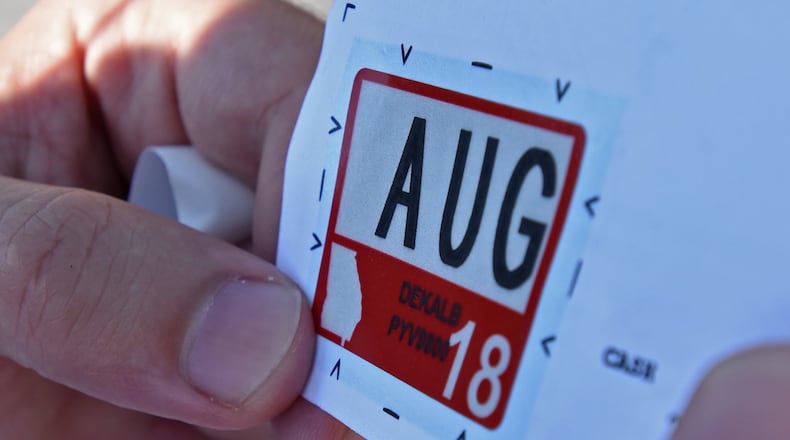It is one of the most common experiences among car owners across the nation: Once a year, for a required fee, receive a decal to stick on your license plate or window showing your vehicle registration is up-to-date.
But now Georgia is flirting with the idea of eliminating the stickers altogether, a potential massive decision given that the decals got stuck on more than 10.7 million vehicles in the last fiscal year alone.
Only a handful of other states have taken such a step, which has been estimated to save millions of dollars.
In Georgia, however, the move wouldn’t necessarily eliminate the state’s standard $20 annual registration fee (not including extra fees for specialty plates or additional tax based on a vehicle’s assessed value) and concerns remain.
“I’m not really sure of the intent here,” said Kevin Payne, Floyd County tax commissioner and president of the Georgia Association of Tax Officials, who was among two dozen people who met with the state Department of Revenue earlier this month about the idea.
“The fact that I would still have to pay the tax on my birthday, I’m not really saving anything except I don’t have to put the decal on my license plate,” Payne said.
A majority of states across the nation still use license plate or window decals to visually signal a vehicle’s registration status. The small group that don’t include Connecticut, New Jersey and Pennsylvania.
Pennsylvania, which had required the stickers on-and-off for the past 74 years, stopped issuing them just this year, estimating the move will save the state more than $3 million annually in printing and mailing costs.
Car owners there are still required to register their vehicles and hold a current registration card, and state officials point to a Pennsylvania State University study that said eliminating the sticker would have no impact on vehicle registration compliance.
That state also went to a two-year registration cycle, something that could be a potential compromise here.
In Georgia, the idea has been floating around for a while but there is no definitive plan. Instead, for the first time, the Revenue Department has been tasked with a fact-finding mission. Its report is due to the state Legislature by Jan. 1.
The findings are expected to kick-start a more serious consideration of the idea, although notable hurdles remain.
Law enforcement agencies have told state officials that doing away with the decals would take away the only visual clue officers have of quickly seeing if a vehicle is currently registered.
A missing or expired decal can be cause for a traffic stop, and officers have said it can help them determine whether there might be other criminal activity.
A potential alternative would be to buy electronic license plate readers, which some police agencies in Georgia already use and are connected to databases that show registration status, among other information. The readers themselves, however, can cost $15,000 or more per unit, with bigger agencies likely having to consider a cost upwards of $1 million to equip their fleets.
Smaller agencies might not have the financial power to cover the cost, something that could be helped by federal grants. The state, too, could create its own grant program, a decision that would require buy-in from the governor’s office and state Legislature.
The potential benefits, meanwhile, also come with dollar signs.
Georgia could save almost $2 million annually by not having to print the decals, according to a Revenue Department memo last year.
Local counties in coordination with the state also pay more than $3.9 million annually to print and mail roughly 800,000 registration notices a month to vehicle owners reminding them their registration is coming due. Any reduction in that volume would be an additional savings, the memo said.
According to some large fleet owners, doing away with the annual requirement would also be a huge convenience. The Enterprise rental car agency alone buys 50,000 decals a year in Georgia, according to a representative who attended the agency meeting this month. With that volume came the need to track down those cars and the drivers using them when the time came to update the stickers.
“It is a more efficient way to do things,” Revenue Department attorney Stephen DeBaun said of possibly eliminating — or at least reducing — the stickers’ use. But, he added, considering the money needed to invest in upgrades such as the license plate readers, “there is a significant up-front cost.”
About the Author


